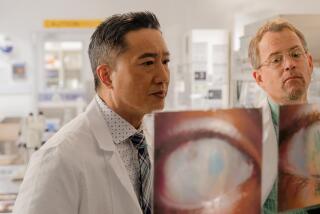The Vision Test
- Share via
Last winter, my wife Ana, our two young sons and I were visiting her mother and stepfather in Cuernavaca, Mexico. Teresa and Gordon had just finished building their retirement home, but there was some landscaping left to do. A man named Che was managing the work and he had hired a couple of local boys to help. As they worked diligently on a small mountain of dirt, Gordon told us their story:
Martin and Samuel were 14-year-old orphans from a remote mountain village called Santa Cruz, in the neighboring state of Guerrero. They were living in the dirt-floor jungle huts that surrounded Cuernavaca. A piece of cardboard was their bed. They were both illiterate and mainly spoke their native tongue, Mixtec.
My wife and I noticed that there was something wrong with Martin’s eyes. Gordon explained that Martin could only see five feet in front of him. He’d had limited vision since birth, and it seemed to have become worse in recent years. Samuel acted as his friend’s eyes.
A short time later, I found myself thinking out loud: “Wouldn’t it be ironic if all Martin needed was a pair of glasses?” Everyone stopped and looked at one another for a very long beat. My wife sprang up and announced that she was taking Martin to an optical shop in the mall. She waited there with great hope while the optometrist checked the boy’s eyes. Unfortunately, Martin’s problem was cataracts, which exceeded a pair of glasses. Ana broke the news to him. She said Martin sat quietly on the ride back to the house, looking only as far as his eyes would allow--to the dashboard.
The next day, Ana and Teresa took Martin to an ophthalmologist and returned with good news: A surgical procedure could correct his condition. Martin and Samuel were quite excited as they resumed their work.
But there were issues: After the procedure, Martin could not work for two months, because the increased blood pressure could damage his eyes. The doctor was also concerned about Martin’s returning to the jungle to heal, because of the possibility of infection. The surgery would cost thousands of dollars, but if he didn’t have it, he would go completely blind within a year.
The room went silent. What started out as a simple trip to get a young man a pair of glasses had turned into a major gut-check for all of us.
We looked out the window as Martin excitedly explained to Che that he could be healed. We couldn’t turn our backs now. Gordon and Teresa said that Martin and Samuel could spend the anticipated two days of recovery time in their guest house. Members of the Orinda Country Club, to which my father-in-law belonged, offered to join the growing group of people now committed to paying for the surgery. We then went outside and told Martin the good news. He was elated and wanted to return to his village to tell his friends.
The next morning, some good karma arrived in the form of Alfonso Sanchez Arce, a neighbor and anesthesiologist who happened to work with an ophthalmologist. After we shared Martin’s story, he graciously offered to donate his services. He also offered to get the hospital to reduce its fees and his partner to do the operation for half price.
When we told Martin, he now seemed hesitant. When asked why, he explained that the people in his village told him it was too good to be true. They tried to convince Martin that we must have a sick relative somewhere who needed an organ, which would be stolen from Martin when he was under anesthesia.
We were shocked, and took turns explaining that we truly only wanted to help. My wife told him: “The only thing I want from you is to use this opportunity to help you grow up to be a good man.” Gordon and Teresa said: “There is an angel that protects you, Martin, and that angel has obviously touched our hearts.” I told him: “The only thing I want is for you to see a sunset.” Martin sensed our sincerity and agreed to the surgery. He did ask if Samuel and Che could also be there. We assured him that was possible and jokingly asked, “What’s Samuel going to do once you can see?” Martin said that Samuel would be equally happy for his sight: “Then we can look at cute girls together.”
That night, more good karma: My brother-in-law, Carlos, and his wife, Marcela, came to visit. They had never met Martin, but when they heard of his plight, they offered to pay for one-third of the costs.
Two days later, Gordon took Martin in for his surgery. My family and I were returning to L.A. that day, but we stopped by the hospital to say goodbye. The ophthalmologist, Raul Montiel, came out and announced that there had been no complications.
Soon after arriving home, we called Teresa and Gordon to check on Martin. They had removed the bandages from his eyes as he stood on the porch of their guest house. Martin squinted, gently rubbed his eyes, then smiled. He was able to describe the colors of the bougainvillea on the far side of the yard. A moment later, Martin looked up and stared at a passing airplane. He had only heard them before. As Teresa and Gordon relayed these moments, there was not a dry eye on either side of the line.
Martin’s first week with his new eyes was filled with many more special moments. Gordon e-mailed to tell us that Martin and Samuel were still in the guest house; he and Teresa didn’t have the heart to send them back into the jungle. They did, however, take the boys to their village one day at Martin’s request. He wanted to find the naysayers and tell them that they’d been wrong, that there are people left in the world who just want to help. He then boasted to them that he could see 400 meters. Gordon asked Martin if he could make out the small cloud of smoke floating from the top of Popocatepetl. Martin nodded. Gordon explained to him that the volcano was 64 kilometers (about 40 miles) away. Martin smiled.
Looking back, it would have been easy to take the typical attitude that there are millions of kids like Martin here and around the world, and that you can’t help them all. But to describe the blessing we all received by helping one child is difficult to put into words. This young man once walked with hunched shoulders, looking only at the ground. His face was racked with more pain than a boy his age should ever show. Gordon and Teresa say that Martin is a new person. He looks you in the eye and walks with a spring in his step. During his recuperation, he asked Gordon and Teresa whether, since he couldn’t work, they would teach him how to read and write.
Oh, that we might all look at the world like Martin, with renewed vision. One that encourages compassion in a time of indifference, in a world that sometimes forgets how truly easy it is to love.
Seeing is believing.


